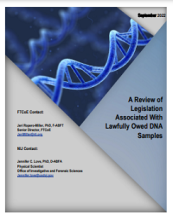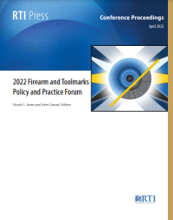Professional Criminals
Evaluation of Pretrial Home Detention With Electronic Monitoring: Brief Summary
Youth Gangs in North Carolina's Communities
Forgotten Evidence: A Mixed Methods Study of Why Sexual Assault Kits (SAKs) Are Not Submitted for DNA Forensic Testing
A longitudinal cohort mixed methods study of the impact of mental health on retention and turnover among early career police officers in South Carolina
The Extremism Sentencing Study: Judicial Outcomes and Recidivism Among Individuals Convicted of International and Domestic Terrorism
Keeping Pace With the Evolution of Illicit Darknet Fentanyl Markets: Using a Mixed Methods Approach to Identify Trust Signals and Develop a Vendor Trustworthiness Index
Driving Down Gun Violence, Part 1
Three LEADS Scholars serving in different law enforcement agencies and positions discuss their experiences with identifying and implementing evidence-based interventions to reduce gun violence. NIJ Senior Advisor Dr. Tamara Herold hosts this conversation with guests Police Chief Cecilia Ashe (Milford Delaware Police Department), Chief of Staff Lieutenant Matthew Barter (Manchester, NH Police Department), and Analytical Services Manager Mr. Jason Schiess (Durham, NC Police Department).
Just Science Podcast: Just Investigative Support for Indigenous Communities
Digital Transformation of Cold Case Reviews: Prevalence, Challenges, and Benefits of Just Resolutions
A Review of Legislation Associated With Lawfully Owed DNA Samples
The Evolving Character of Public Defense: Comparing Criminal Case Processing Effectiveness and Outcomes Across Holistic Public Defense, Traditional Public Defense, and Privately Retained Counsel
Enhancing Supervision and Support for Released Prisoners
Alleviating Jail Crowding - A Systems Perspective
Conference Proceedings: 2022 Firearm and Toolmarks Policy and Practice Forum
From Successful Reentry to Stronger Communities
Desistance: It's a Process, Not an Event
From Funnels to Large-Scale Irrigation: Changing the Criminal Justice System Paradigm to Improve Public Health and Safety
Domestic Violence and Mass Shootings: A Review of Current Academic Literature
Trauma and Coping Mechanisms Exhibited by Forensic Science Practitioners: A Literature Review
Expanding Research to Examine the Impacts of Forensic Science on the Criminal Justice System
In 2004, the National Institute of Justice created the social science research on forensic sciences (SSRFS) research program to explore the impact of forensic sciences on the criminal justice system and the administration of justice. Much of the early research from the SSRFS program focused on DNA processing and the use of DNA in investigations and prosecutions.
See the YouTube Terms of Service and Google Privacy Policy








